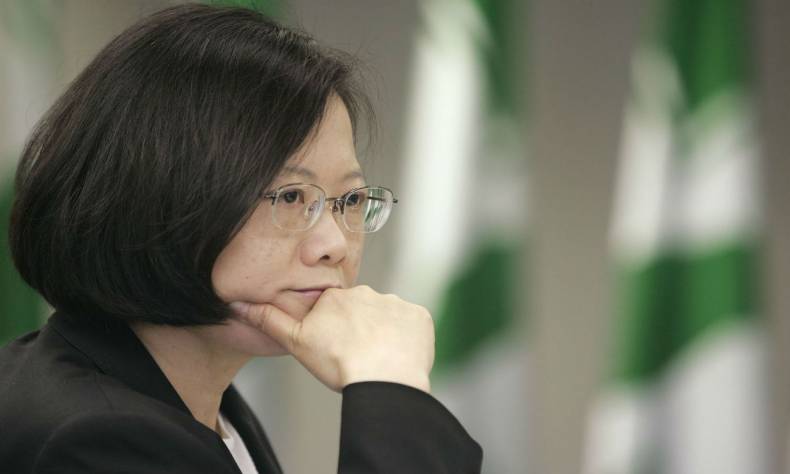
What is China’s Reaction to the Possible Meeting between Trump and Tsai Ing-wen?
Sino-US relations and cross-Strait relations have entered a new high-risk period since the Taiwan Travel Act was signed by the US President Donald Trump and came into effect on March 16.
By Zhang Jian
Sino-US relations and cross-Strait relations have entered a new high-risk period since the Taiwan Travel Act was signed by the US President Donald Trump and came into effect on March 16.
The signing of a Taiwan-related travel bill by the United States had sent a “gravely wrong signal” to “Taiwan independent” separatists.
“I would like to sternly warn Taiwan authorities that relying on foreigners to build you up will only draw fire against yourself,” said An Fengshan, spokesman for the Taiwan Affairs Office of the State Council.
“The bill had caused a severe blow to the complex and grave situation of cross-Strait relations and the peace and stability across the Taiwan Straits,” An said.
No Bewildering of the Word ‘Travel’
Taiwan Travel Act is evidence of the United States’ undermining of overall Sino-US relations on the Taiwan question. Essentially, it aims to strengthen the official relationship between the US and Taiwan by promoting exchanges and visits between the US and Taiwan at the official level. In short, it seriously violates the Three Sino-US Joint Communiqués and One-China Principle.
The Three Sino-US Joint Communiqués were signed by the governments of the United Statesand the People’s Republic of China. These communiqués played a crucial role in the normalization of relations between the US and China, and will continue to be an essential element in the current and future dialogues between the two countries.
Therefore, a literal Chinese translation of the Taiwan Travel Act into “a law encouraging travel to Taiwan” fails to reflect the intentions and motives of the US. However, a law on communication with Taiwan” in Chinese can better reflect its essence. Don’t be fooled by the word travel.
Taiwan Travel Act was passed by the House of Representatives and the Senate of the US this year and was signed by President Trump in early March. This is one of the most important acts in the US related to Taiwan since the signing of Taiwan Relations Act, after diplomatic relations between Taiwan and the US were cut in 1979.
Trump has now caused damage to overall Sino-US relations on the Taiwan question on two occasions. The first was when he spoke on the telephone with Tsai Ing-wen. This is the second.
The entry into force of Taiwan Travel Act demonstrates that the restriction on high-level exchanges between the US and Taiwan has been lifted, indicating that Trump can visit Taiwan and Tsai Ing-wen can visit the US, increasing the possibility of a meeting between Trump and Tsai Ing-wen. Whether they will do this remains to be seen.
Laying the Cards on the Table or just Sounding Things Out?
In the past two years, the US Congress has passed a series of official acts related to Taiwan, such as Taiwan Security Act, National Defense Authorization Act, and Taiwan Travel Act.These have served to improve military relations between the US and Taiwan and provide a counterweight to China. It is now a routine matter to see US warships docked in Taiwan’s harbors. This conduct seriously inhibits the normal development of Sino-US relations, and exacerbatesexisting tension in cross-Strait relations.
Trump’s endorsement of Taiwan Travel Act follows his attempts to take new trade measures against China, and either of his actions could become a major turning point in Sino-US relations.
In recent years, the US has applied continuous pressure to China on such issues as economic exchange and trade with the US and the Taiwan question. In addition, the new China threat theory represented by the sharp power has been widely reported in the Western media. Even if it is not ready for a showdown, the US is sounding out China’s attitude.
In the next few years, the US will promote its Indo-Pacific strategy, a strategy much harder than the Asia-Pacific “rebalancing strategy” of the Obama administration. It will certainly seek to provoke China on many flashpoint issues including Taiwan.
There are growing calls for Taiwan independence, and Tsai Ing-wen does not accept the 1992 Consensus. As a result, peaceful development across the Taiwan Straits is no longer stable.The US is supporting those who favor Taiwan independence as a counterweight to the Chinese mainland.
Superficially, the entry into effect of Taiwan Travel Act may be beneficial to the DPP andTsai Ing-wen’s administration, in strengthening its relations with the US. However,as a pawn in a game between two major powers, Tsai Ing-wen is in a very risky position.
What Counter Measures will be Taken by China?
After Taiwan Travel Act was passed, China’s Ministry of Foreign Affairs, China’s Ministry of National Defense, China’s Taiwan Affairs Office of the State Council and the Chinese Embassy in the US made strong representations.
A Spokesman of China’s Ministry of Foreign Affairs, Hua Chunying, stated at a press conference on March 1: “At the very moment when a new government is being established, China will not passively tolerate this provocation from the US. The Chinese government and its new leadership have the wisdom to deal with this provocation.”
The Trump administration is in a mess. It is therefore trying to gain credibility by demonstrating toughness in diplomacy, but the results are likely to be counter-productive.
In the new era, no matter how hard others try to disrupt China’s diplomatic strategy, China will do its best to maintain strategic stability.
Zhang Jian, Doctor of the Research Centre of Taiwan, Hong Kong, and Macao, Shanghai Institute of International Studies.
 Facebook
Facebook
 Twitter
Twitter
 Linkedin
Linkedin
 Google +
Google +











